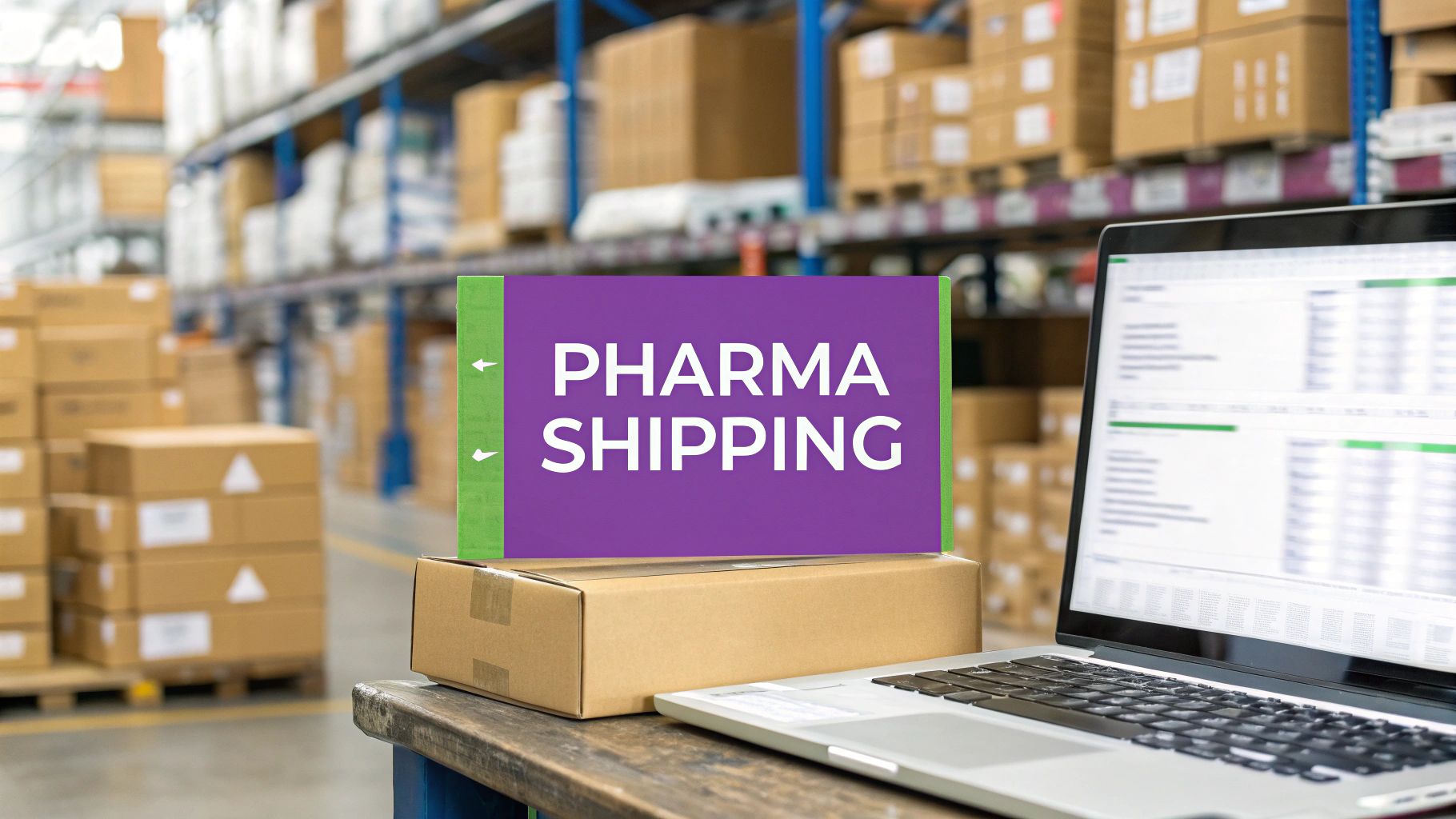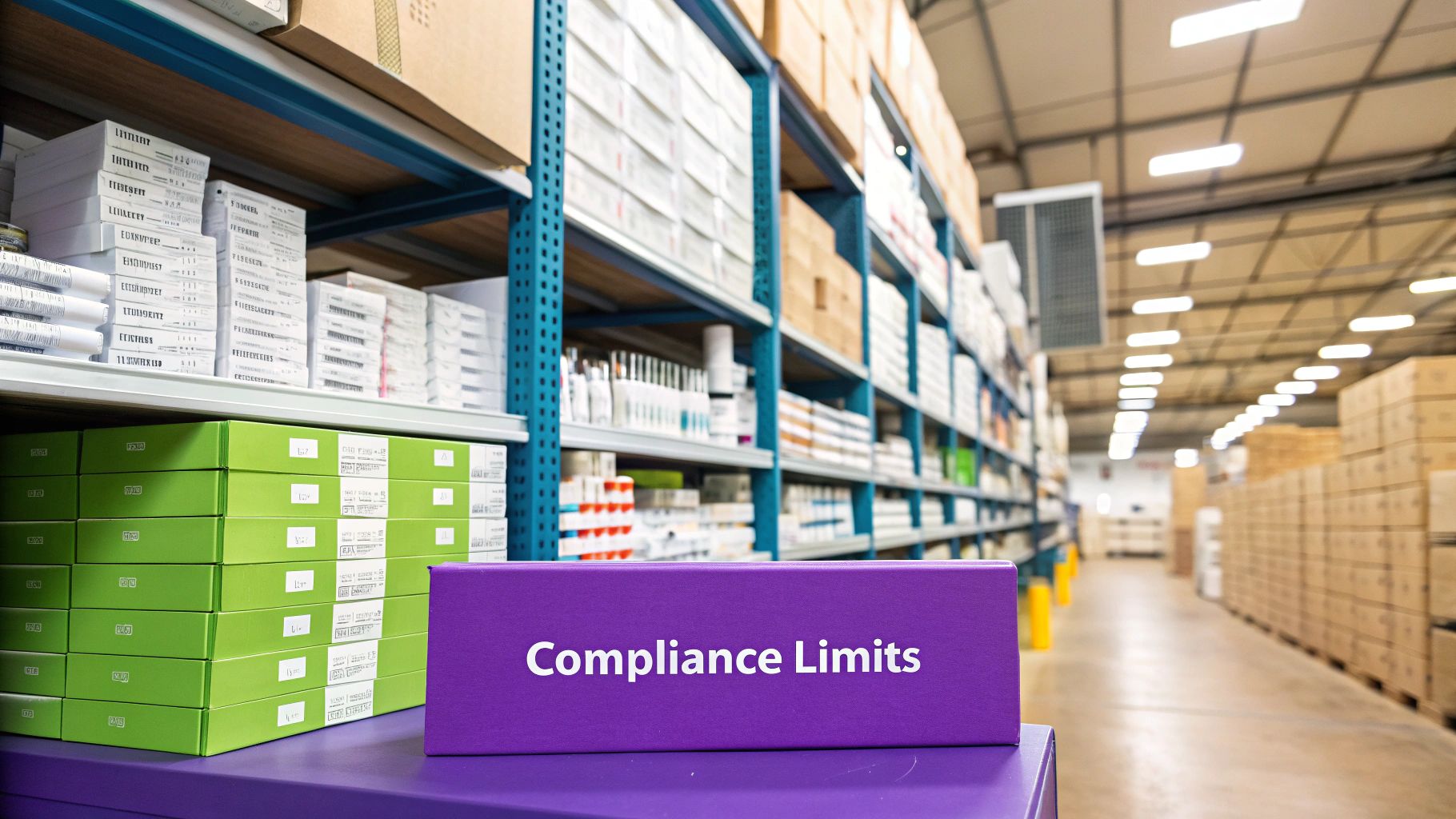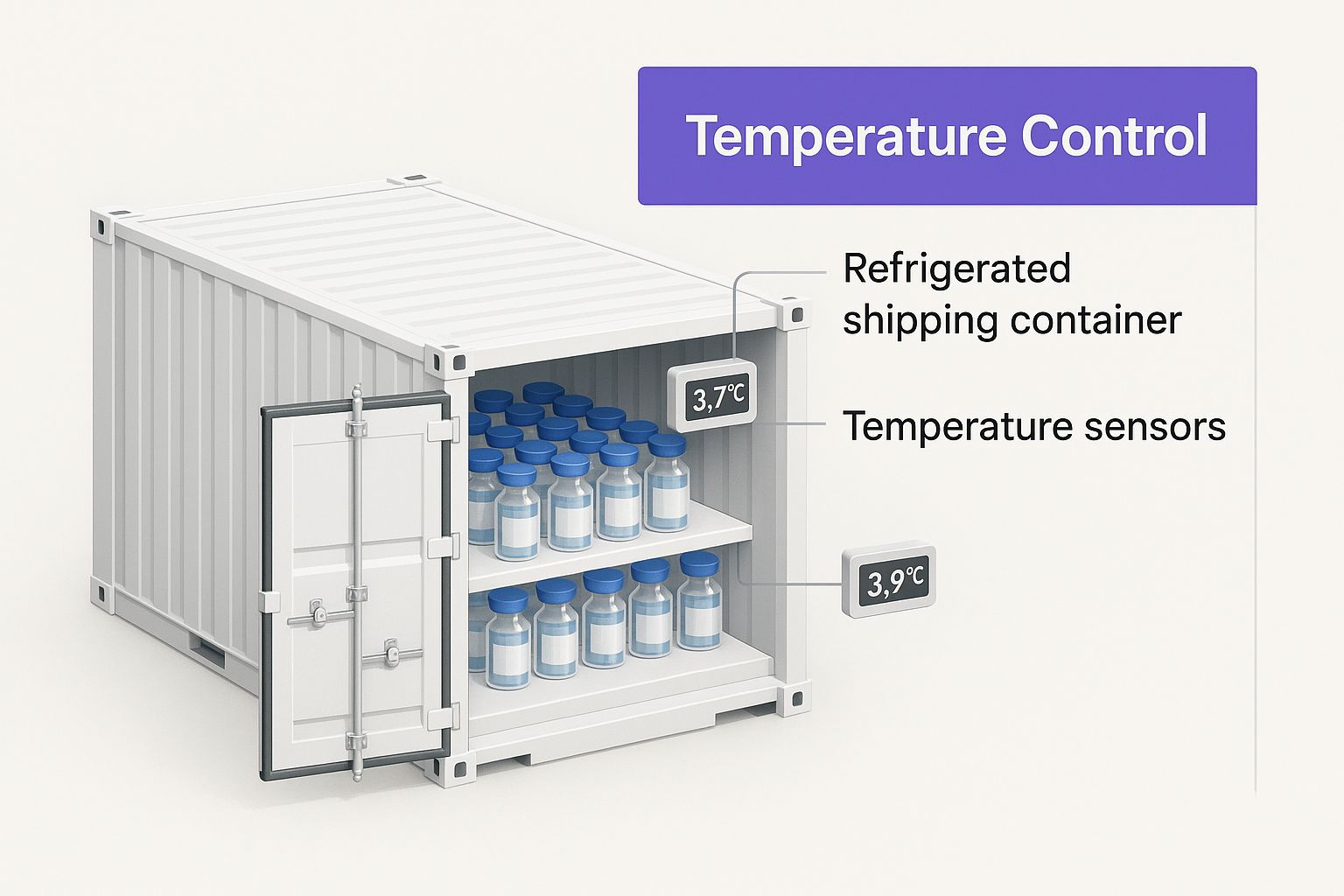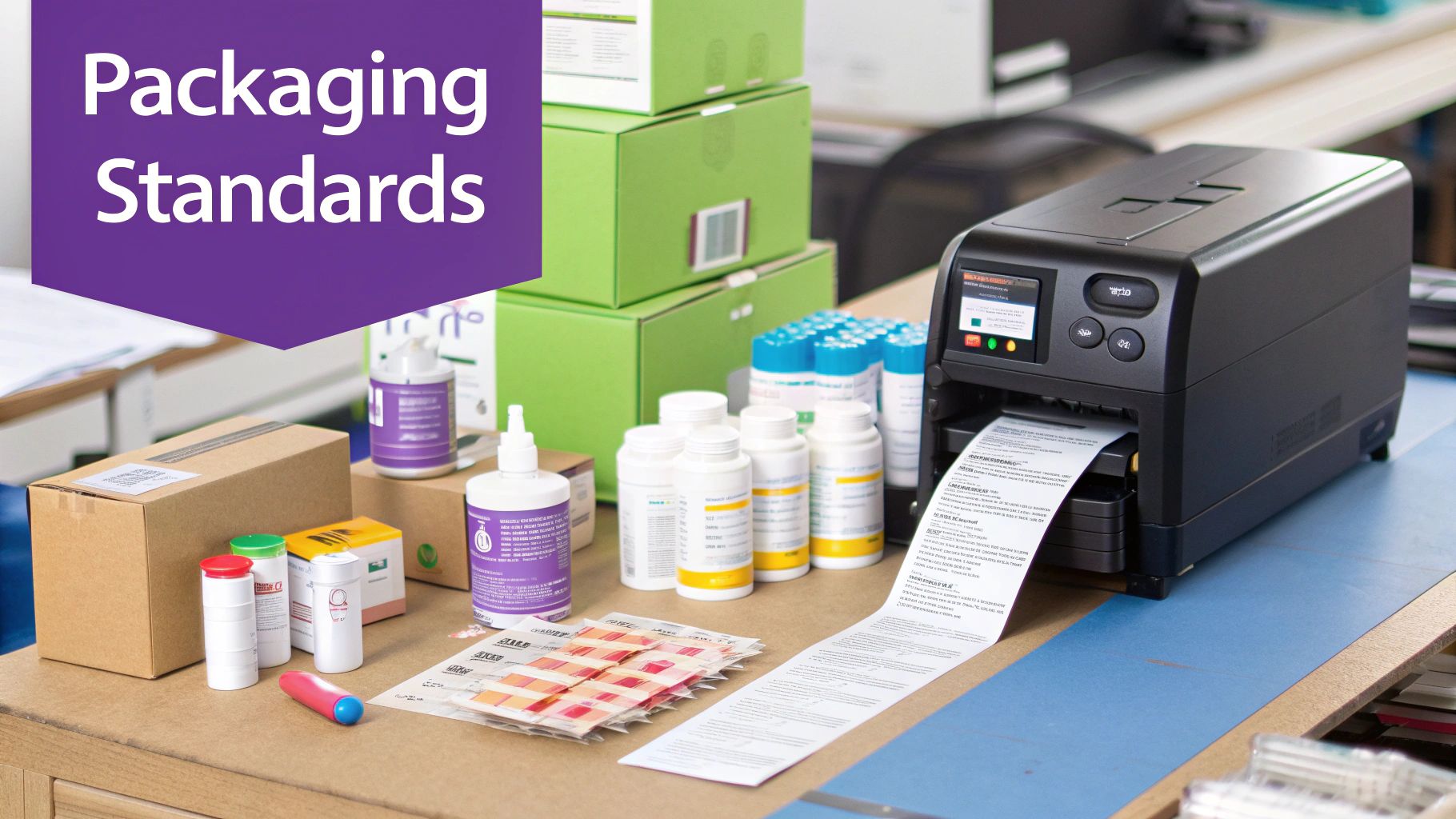
Pharmaceutical Shipping Limitations: WooCommerce Solutions Explained
Learn how Pharmaceutical Shipping Limitations: WooCommerce Solutions help manage restrictions, automate compliance, and streamline your online pharmacy shipping.
Cody Y.
Updated on Aug 30, 2025
Selling pharmaceuticals online isn't like selling t-shirts. You're dealing with a maze of shipping regulations that standard e-commerce stores never have to think about. The answer lies in using a specialized WooCommerce plugin, like Ship Restrict, to build precise rules that automatically block non-compliant orders based on the product, the destination state, and even the customer's zip code. This turns a tangled web of pharmaceutical shipping limitations into a smooth, automated workflow.
The High-Stakes World of Pharmaceutical E-commerce
 For WooCommerce store owners in the pharmaceutical space, every sale is a high-stakes transaction. Unlike shipping apparel or electronics, every package carries significant legal and ethical weight.
For WooCommerce store owners in the pharmaceutical space, every sale is a high-stakes transaction. Unlike shipping apparel or electronics, every package carries significant legal and ethical weight.
A single mistake—like sending a restricted item to an unlicensed state—can trigger severe penalties, the loss of your license, and devastating damage to your reputation. The pressure to get every single order right is immense.
Navigating a Complex Regulatory Maze
The real challenge is the sheer complexity of the rules. There’s no single, national rulebook. Instead, you're navigating a patchwork of federal, state, and local laws that are constantly in flux. In this environment, precision is everything, and trying to manage it all by hand is a recipe for disaster. It’s simply not a sustainable or scalable strategy.
This intricate web of regulations is one of the biggest operational hurdles for online pharmacies. Let's break down the core challenges.
Core Challenges in Pharmaceutical E-commerce Shipping
| Challenge Area | Specific Limitation Example | Business Impact |
|---|---|---|
| State-by-State Licensing | A pharmacy is licensed to ship a specific drug to 35 states but receives an order from a customer in an unlicensed state. | Canceled orders, customer frustration, and the risk of heavy fines if the order slips through. |
| Product-Specific Restrictions | Certain over-the-counter medications cannot be shipped to specific zip codes due to local ordinances. | Manual order verification slows down fulfillment and increases the chance of human error. |
| Carrier Regulations | A shipping carrier like FedEx or UPS has its own rules for transporting temperature-sensitive biologics, which differ from standard shipments. | Increased shipping costs, logistical complexity, and potential for product spoilage if not handled correctly. |
| Quantity & Dosage Limits | Some states limit the quantity of a particular active ingredient that can be sold to a single household within a 30-day period. | Complex inventory and order tracking are required, making manual oversight nearly impossible at scale. |
Each of these challenges represents a potential point of failure that can put your business at risk. Without an automated system, you're essentially relying on manual checks to catch every possible compliance violation, which is a massive operational bottleneck.
The Growing Demand for Compliant Shipping
The market for getting these products delivered safely is booming. The global pharmaceutical transportation services market hit an estimated USD 78.61 billion in 2024 and is on a sharp upward trend. This growth is fueled by an increasing demand for specialized products like biologics and vaccines that need meticulous handling. You can find more data on this trend at grandviewresearch.com.
Navigating this landscape requires more than just a standard e-commerce setup. It demands a system built for compliance, one that can enforce complex shipping rules without manual intervention, turning potential liabilities into a competitive advantage.
This is where automated WooCommerce solutions become mission-critical. They create a reliable framework for enforcing pharmaceutical shipping limitations, making sure every sale is compliant from the moment a customer clicks "checkout." By using the right technology, you can protect your business, keep your customers safe, and get back to focusing on growth.
To see how this works in practice, you can explore our dedicated guide on how Ship Restrict helps manage pharmaceutical sales.
Wrestling with the Regulatory Maze

Selling pharmaceuticals online isn’t like standard retail; it's more like navigating a dense jungle with three different maps at once. One map shows the national terrain, another details state-specific hazards, and the third lays out the specific trails cleared by your shipping carrier.
You have to follow all three maps simultaneously. Ignore one, and you’re not just lost—you’re facing serious legal and financial consequences. These layers of rules exist for a good reason: they protect patient safety, guarantee product integrity, and ensure accountability every step of the way. This is precisely why a blanket "ship to all 50 states" strategy is a non-starter for any online pharmacy. Getting a handle on this hierarchy is the first step to building a compliant WooCommerce store.
The Federal Foundation
At the very top, you have the big players: federal agencies like the Food and Drug Administration (FDA) and the Drug Enforcement Administration (DEA). They draw the broad, non-negotiable borders for the entire country.
These agencies set the ground rules for how prescription drugs, controlled substances, and even some over-the-counter products are made, labeled, and sold. Think of their regulations as the foundational law of the land that applies no matter where you or your customers are.
State-Level Specifics
Just below the federal umbrella, each state has its own Board of Pharmacy. This is where things get complicated. These boards add a second, more granular layer to your map, creating rules that are only valid within their specific borders.
To ship prescription medications to a patient, a pharmacy must be licensed in that patient's state. This means you could be perfectly licensed to serve customers in California but legally blocked from sending the exact same product to someone one state over in Arizona.
These state-by-state licensing hurdles are the single biggest driver of pharmaceutical shipping limitations for online stores. One misstep can lead to hefty fines or, even worse, the revocation of your licenses, effectively putting you out of business in that region.
Carrier and Logistical Rules
Finally, the shipping carriers themselves—companies like FedEx, UPS, and DHL—add the third and final layer of complexity. They have their own internal playbooks for handling sensitive medical shipments, and their rules often go above and beyond what the law requires.
These carrier-specific policies can dictate things like:
- Packaging Requirements: Mandating insulated containers or specific cushioning for fragile vials.
- Temperature Control: Enforcing strict protocols for cold-chain logistics to keep products like insulin within a precise temperature range.
- Signature Confirmation: Requiring an adult signature upon delivery for high-value or controlled medications.
- Prohibited Items: Outright refusing to transport certain classes of hazardous materials or high-risk drugs.
The infographic here gives you a great visual of how critical elements like temperature control are managed, from specialized containers to tracking sensors. It’s a stark reminder that keeping the product stable and safe during transit isn't just a good idea—it’s a non-negotiable rule enforced by both regulators and the carriers themselves. Juggling these three layers—federal, state, and carrier—is the core challenge for any pharmacy selling through WooCommerce.
Common Shipping Hurdles You Will Face

It’s one thing to read about regulations, but it's another thing entirely to see them pop up in your WooCommerce checkout every single day. These aren't just abstract legal ideas; they're real, practical problems that can stop an order dead in its tracks.
Picture this: a customer in Texas tries to order a prescription medication from your online pharmacy. You’re licensed in 48 states, but Texas happens to be one of the two you aren’t. Without an automated system, that order could easily slip through, creating a massive legal and financial headache.
This is, by far, the most common and high-stakes restriction online pharmacies run into.
Every time a non-compliant shipment goes out the door, it kicks off a chain reaction you don’t want to deal with. You’re suddenly handling returned packages, eating shipping fees, calming down frustrated customers, and hoping you don’t attract the wrong kind of attention from state pharmacy boards.
State-Based Prescription Drug Licensing
The absolute cornerstone of selling pharmaceuticals online is license verification. You simply cannot legally ship prescription drugs to a state where your pharmacy doesn't hold an active license.
Trying to cross-reference every single order against a spreadsheet of approved states isn't just slow—it's a recipe for disaster. One slip-up can lead to serious penalties. This is where a solid WooCommerce solution becomes essential, acting as a digital gatekeeper that instantly checks an order’s destination against your specific licensing footprint.
Local Rules for Over-the-Counter Products
And it's not just prescription drugs. Plenty of over-the-counter (OTC) products have their own tricky, localized rules. For instance, some towns restrict the sale of products containing pseudoephedrine, while certain states have strict age verification requirements for specific supplements.
These rules can get incredibly specific, sometimes changing from one zip code to the next. Managing this requires a system that can drill down to a hyper-local level, blocking sales that violate these nuanced regulations before they become a problem.
The real danger is in the details. A single product might be perfectly fine to ship to one address but restricted in the zip code right next door. Failing to manage that granularity is how businesses end up with fines and a damaged reputation.
International and Cold-Chain Logistics
Thinking about selling internationally? That adds a whole new layer of complexity. Geopolitical shifts can mess with logistics overnight, with new trade tensions leading to tariffs as high as 25% on certain pharmaceutical components. Recent analysis shows these changes have already driven up logistics costs by 10% to 15% for most U.S. pharma firms.
Then you have temperature-sensitive products like biologics or vaccines that demand strict cold-chain shipping. This method is expensive and often limited to a tight geographic area, like next-day air only. You need a way to restrict these items to only the shipping zones you can actually service, preventing you from taking orders you can't fulfill safely.
For a deeper dive into the different kinds of rules you might encounter, check out our guide on understanding shipping restrictions. Once you get a clear handle on these real-world problems, you can see exactly how an automated WooCommerce tool is designed to solve them.
How to Automate Compliance in WooCommerce
<iframe width="100%" style="aspect-ratio: 16 / 9;" src="https://www.youtube.com/embed/9grxkwNm-zQ" frameborder="0" allow="autoplay; encrypted-media" allowfullscreen></iframe>Trying to manage complex pharmaceutical shipping rules with spreadsheets and manual order checks is more than just inefficient—it’s a high-stakes gamble. A single human error can trigger a compliance violation, leading to hefty fines, returned shipments, and a damaged reputation. The only reliable solution is to remove human error from the equation completely.
This is where a powerful WooCommerce plugin designed specifically for automating compliance comes in. Think of it as a digital compliance officer that integrates directly into your checkout process. It stands guard 24/7, tirelessly checking every single order against the rules you've set.
Your Automated Gatekeeper
Imagine an automated system acting as a gatekeeper the moment a customer tries to buy. As they enter their shipping address, the system instantly cross-references it with your specific rules for the products in their cart.
If an order breaks a rule—like trying to ship a restricted drug to a state where you aren't licensed—the system automatically blocks the sale. It then shows the customer a clear, custom message explaining why the order can't proceed. This immediate feedback prevents confusion and protects your business.
This flips your compliance strategy from reactive to proactive. Instead of catching mistakes after they happen, you stop them from ever occurring in the first place.
How Rule-Based Automation Works
The core of this system is a simple but powerful "if-then" logic. You create rules that tell WooCommerce what to do under specific conditions. This granular control lets you tackle the most common pharmaceutical shipping limitations with precision.
Here are just a few examples of rules you can build:
- State-Level Licensing: Block a specific prescription drug from being shipped to states like California or New York where you don't hold a pharmacy license.
- Local Ordinances: Prevent an over-the-counter product from being sent to a list of specific ZIP codes that have local restrictions.
- Delivery Method Rules: Disable certain shipping options for products that need temperature control, making sure they only go via an approved cold-chain carrier.
This screenshot shows just how simple it is to build a rule, in this case, a restriction for a specific state.
The interface lets you set up these complex conditions in minutes, translating dense regulatory requirements into actionable logic for your store.
By putting these automated checks in place, you guarantee consistent enforcement of every rule for every order. It's a level of accuracy that manual processes can never hope to match, allowing you to scale your business safely and confidently. You can see how the Ship Restrict WooCommerce plugin provides this level of detailed control.
Automation isn't just about efficiency; it's about building a fortress of compliance around your e-commerce operations. It ensures that no matter how complex the regulations become, your store remains protected against costly errors and legal risks.
Ultimately, using a dedicated WooCommerce solution for shipping restrictions moves your business away from risky manual oversight. It gives you a reliable, scalable framework to handle the unique challenges of the pharmaceutical industry, letting you focus on growth instead of constantly worrying about compliance.
Putting Shipping Rules into Practice
Knowing the regulations is half the battle. The real magic happens when you turn that knowledge into automated, hands-off rules inside WooCommerce. This is where we get our hands dirty.
Let’s walk through three common scenarios every online pharmacy runs into. We'll break down how to translate tricky compliance requirements into simple, effective logic that works while you sleep.
These examples show exactly how a smart WooCommerce setup can manage the most common pharmaceutical shipping limitations with precision.
Scenario 1: State-Based Licensing
Imagine your pharmacy is licensed to dispense a specific prescription drug in every state except California and Texas. You absolutely cannot ship this product to a customer with a shipping address in those two states.
This is probably the most fundamental rule for any online pharmacy. The logic is simple: if a specific drug is in the cart and the customer's address is in a state you're not licensed in, checkout must stop.
- Rule Logic:
- IF Cart contains
[Specific Prescription Drug] - AND Shipping State is
CaliforniaORTexas - THEN Block checkout and show a clear message like, "We are not licensed to ship this medication to your state."
- IF Cart contains
Scenario 2: Temperature Control for Cold-Chain Products
Now, let's say you sell a temperature-sensitive biologic. It needs overnight, cold-chain shipping to stay effective and safe. Your logistics partner can only guarantee next-day delivery to a specific list of ZIP codes on the East Coast. Shipping it anywhere else is a non-starter.
This kind of rule protects both the patient and your business from product spoilage. The global pharmaceutical logistics market is booming—expected to be worth around USD 99.89 billion in 2025 and projected to nearly double by 2032. This growth is all about the rising demand for reliable, temperature-controlled shipping. It’s a huge market, and you can learn more about its complexities to see why automating these logistics is so critical.
- Rule Logic:
- IF Cart contains
[Cold-Chain Biologic] - AND Shipping ZIP Code is NOT in
[List of Approved ZIP Codes] - THEN Stop checkout and explain, "This item requires special cold-chain shipping, which is not available in your area."
- IF Cart contains
Scenario 3: Signature Required, No P.O. Boxes
Finally, consider a high-value medication that requires an adult signature upon delivery. Carriers like FedEx and UPS won't deliver signature-required packages to P.O. Boxes. You need a rule to catch this at checkout before it becomes a shipping headache.
A simple address validation rule like this nips a common—and expensive—shipping error in the bud. It stops undeliverable packages before they even leave your facility, saving you time, money, and a whole lot of customer frustration.
- Rule Logic:
- IF Cart contains
[Signature-Required Medication] - AND Shipping Address contains
P.O. Box(or similar text) - THEN Block the checkout and prompt the customer: "This medication requires a signature and cannot be delivered to a P.O. Box. Please provide a physical address."
- IF Cart contains
These three examples are just the tip of the iceberg, but they show the kind of flexibility you need to handle any compliance challenge thrown your way. By building a clear set of rules, you can transform your WooCommerce store from a simple storefront into a powerful, automated compliance engine.
Got Questions? Let's Talk Compliance
Switching to an automated system for something as critical as pharmaceutical shipping is a big step. It’s natural to have questions about how it all works in the real world. You need to be certain the tool you choose can handle the tricky, day-to-day challenges without adding new headaches.
Let’s walk through some of the most common questions we hear from store owners. We'll give you straight, clear answers so you can see exactly how a powerful restriction plugin solves these problems.
Can I Block Shipping to Specific ZIP Codes?
Yes, absolutely. This is exactly the kind of granular control you should expect. A good system lets you create rules that block a single product or an entire category from shipping to a specific list of ZIP codes.
This feature is perfect for dealing with hyper-local shipping needs. For instance, you can easily map out your cold-chain delivery zones or prevent certain items from going to neighborhoods with unique local ordinances. The check happens instantly when a customer enters their ZIP code, blocking the order if it violates your rule.
How Does the System Handle Complex State-by-State Rules?
This is what these tools are built for. You can set up layered, conditional rules like, "Product X cannot ship to Texas, Florida, or California." When a customer from one of those states tries to check out, a custom message you’ve written will pop up, and the sale is blocked.
You can build dozens of these rules to create a rock-solid compliance framework. It gives you a single, central dashboard inside WooCommerce to manage exactly which products can go to which states.
The real power comes from layering multiple rules. You can have state-level licensing rules, ZIP code-based temperature control rules, and carrier-specific rules all working together to make sure every single order is compliant.
Will Shipping Restriction Rules Slow Down My Checkout?
Not if you’re using a professionally built plugin. A well-optimized tool is designed to have virtually no impact on your site’s speed or the customer's checkout experience. The system runs its checks efficiently on the server side the moment a customer enters their shipping info.
The validation happens in a blink. The security, peace of mind, and money you save by preventing non-compliant orders and expensive mistakes far outweigh any tiny bit of server processing time. For the best results, always go with a reputable, performance-focused plugin to manage your pharmaceutical shipping limitations.
Ready to automate your shipping compliance and put an end to costly errors? Ship Restrict gives you the granular, rule-based controls you need to manage pharmaceutical shipping limitations with complete confidence. Protect your WooCommerce store and streamline your operations today with Ship Restrict.

Cody Yurk
Founder and Lead Developer of ShipRestrict, helping e-commerce businesses navigate complex shipping regulations for regulated products. Ecommerce store owner turned developer.